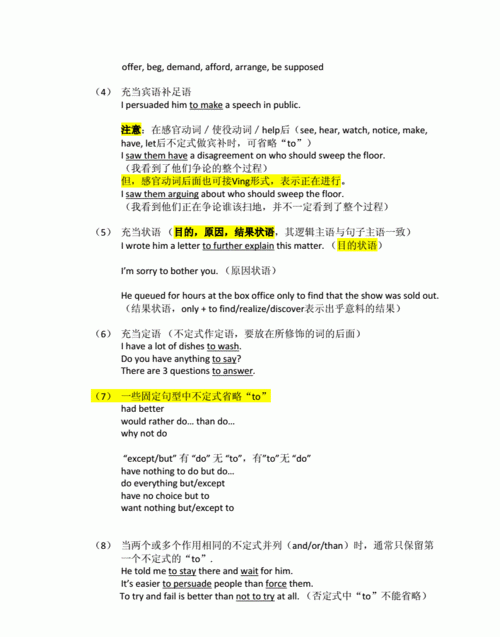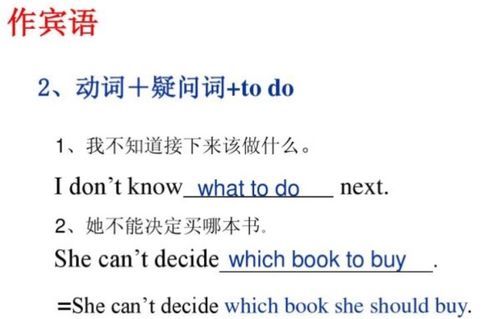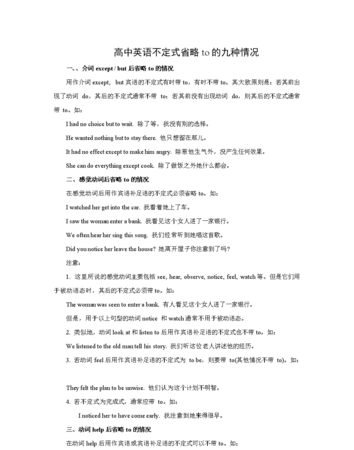本文目录
to do不定式的用法总结
动词不定式的用法:1、动词不定式做主语时,用it作形式主语,不定式后置。2、动词不定式做宾语常接在谓语动词或系表结构后。3、动词不定式可以做目的状语,可以表达将来时态。4、疑问词+动词不定式表示“应该如何做/何时做/何地做哪些事”。5、特殊句型如“only to do”,意为“竟然”。
动词不定式的用法
一、动词不定式做主语
动词不定式做主语,一般用it作形式主语,不定式后置,具体的句型为It's adj/noun (for sb) to do
It's a pity for you to drop out of school.
= For you, to drop out of school is a pity.
真遗憾,你竟然辍学了。
It's a pleasure for me to be your guest.
= For me, to be your guest is a pleasure.
很荣幸得到你的邀请。
It's a good plan for you to make more friendships.
= For you to make more friendships is a good plan.
广交朋友是个好办法。
It's a good idea for you to eat less fried food
= For you to eat less fried food is a good idea.
你少吃点油炸食品是好想法。
It was difficult to answer the question.
这问题很难回答。
It looked impossible for me to finish on time.
我似乎不可能按时完成了。
It was stupid of him to press the emergency button.
他按了紧急按钮,这真愚蠢。
如果形容词既可以修饰句子中的人,也可以修饰句子中的不定式,人前要用“of”
二、动词不定式做宾语
1. 谓语动词+动词不定式(多数动词属于此类动词)
Some students hate to study English.
有些学生不喜欢研读英语。
You need to study in a quiet place.
你必须在安静的地方读书。
He likes to go to the movie.
他喜欢去看电影。
She wants to help Mary.
她想要帮助玛丽。
She pretended not to go.
她假装不去。
He pretended to be a good man.
他假装是好人。
They agreed to have a meeting the next week.
他们同意下星期开会。
They stopped to have a rest.
他们停下来休息。(停下去做)
I have stopped smoking for half a year.
我已经半年不抽烟了。(停止做)
She remembered to surf the internet to get information.
她记得上网查信息。(记得要做)
I remembered bringing my homework.
我记得带作业了。(记得做过)
We happened to meet at the station.
我们碰巧在火车站相遇。
2. 系表结构+动词不定式
glad,sorry,happy,sad,surprised,troubled等与情绪有关的形容词后常用动词不定式。
I am glad to see him.
我很高兴看到他。
Sue was troubled to see trash everywhere.
苏看到到处是垃圾很苦恼。
Sara was excited to see the rock band.
莎拉看到摇滚乐团很兴奋。
His health is likely to get worse.
他的健康可能会恶化。
三、 动词不定式做宾语补足语
结构︰主语+谓语+宾语+动词不定式
多数动词,常用的有want,get,compel,expect,ask,would like,advise,urge,wish,tell,allow,permit,trouble,help,teach 等。
I told him not to give up.
我叫他不要放弃。
The teacher urged his students to prepare for the exam.
老师劝他的学生准备考试。
They forced me to do things against my will.
他们强迫我做违背我心意的事。
Do you want me to go there instead of you?
要不要我代你到那儿去?
I got him to do it.
我叫他做这事。
Their help enabled me to finish the work with ease.
他们帮助我,使我能够顺利地完成工作。
The father allowed (=permitted) his son to travel abroad alone.
父亲答应让他的儿子单独出国旅行。
We troubled him to turn on the light.
我们麻烦他打开电灯。
We needed someone to fix the tape recorder.
我们需要有人来修理录音机。
注意:动词不定式做make, have, let, hear, see, feel等动词宾语的补足语,要省略“to”
make/have sb. do sth.
I made him do it.
我叫他做这事。
I let him do it.
我让他做这事。
They had/made the girl clean the floor.
他们叫这个女孩打扫地板。
My father will probably have Tom paint the house green.
我爸爸很可能叫汤姆把房子漆成绿色。
He had me help him with his homework.
他叫我帮忙他做家庭作业。
Did you notice anyone come in?
你注意到有人进来过吗?
As far as I remember, I have never seen him smile.
在我记忆中,我从未见他笑过。
I felt my heart beat violently.
我感觉到自己的心跳得很厉害。
She liked to listen to children talk.
她喜欢听孩子们谈话。
四
动词不定式做目的状语
To make sure that he was at home, I called him up in advance.
为了确定他在家,我事先打电话给他。
He came to China to learn Chinese twenty years ago.
他在20年前到中国学中文。
in order/so as + 动词不定式
He must work very hard in order to support his large family.
他必须拼命工作以养活他的大家庭。
Listen carefully so as to follow the teacher.
要仔细听才能听懂老师讲的课。
You must watch your step so as not to fall down.
你必须留心脚下才不会跌下去。
be used + 动词不定式
The book is used to teach us how to write.
这本书教我们如何写作。
The knife can be used to cut meat.
刀能用来切肉。
The book is used as a reference book.
这本书被用来做参考书。
五、动词不定式表达将来
1. be going to ...
说明︰ “将做…”。,表示最近之未来将做的行为或未来的意图。
经常用于口语,表示包含讲话者的主观或感情的情形。
He is going to marry Jane in May.
他打算五月和珍结婚。
I am going to stay up late to finish my paper.
为了完成报告我打算熬夜不睡。
I’m afraid he is going to lose the match.
我恐怕他会输掉比赛。
The train was just going to start when we arrived.
我们到达时,火车马上就要开了。
My father was a sailor and I’m going to be one, too.
我父亲(以前)是水手,我也打算当水手。
2. be about to ...
说明︰意为“将做…”。表示极近的未来之行为。
He was surely about to change his mind. 他一定会改变主意。
She was about to walk out of the door when it began raining.
她正要出门,天下起了雨。
Something unusual was about to happen. 某种不寻常的事正要发生。
3. be to ...
说明︰含有事先的安排或命令,表示“必须…;应该…;打算…”。
At the end of the course, all students are to take a written exam.
本门课程结束时,所有学生都要参加书面考试。
Mr Jones is to speak at the meeting.
琼斯先生将在会议上发言。
4. be bound to ... “一定…”
In such a hurry, she was bound to leave something behind that she would need later.
她走得太匆忙,一定会忘带要用的东西的。
He is bound to come tonight.
他今天晚上一定会来。
After wasting her study time hanging out with friends, Rebecca was bound to fail her quiz the next day.
瑞贝卡浪费学习时间和朋友出去瞎混,她第二天的测试一定不会及格的。
六、疑问词(how/what/when/where/which/whose(+名词))+动词不定式
“应该如何做/何时做/何地做/做哪些事…”。
How do I know what to do and what not to do?
我怎么知道什么该做,什么不该做?
What to do is one question, and how to do it is quite another.
应该做什么和应该怎样做是完全不同的两个问题。
We haven’t decided where to go for lunch. 我们还没有决定去哪里午餐。
There are so many fancy cars on display here that I don’t know which to buy.
有这么多的豪华汽车在此展出,我不知要买哪一辆才好。
I don’t know which advise to follow.
不晓得该听谁的劝告。
How to begin is more difficult than where to stop.
如何着手远比在何处结束来得困难。
The problem is when to get the money we need.
问题是什么时候能得到我们所需要的钱。
I have no other wish except to pass the examination.
我除了要通过考试之外,没有别的心愿。
七、含动词不定式的其它特殊句型
1, ... too ... to ...
说明︰意为“太…而(使某人)不能…”。
He walked too slowly to catch up with me.
他走得太慢而不能跟上我。
It is too dark in this room for me to read a book.
房间太暗,使我无法看书。
This problem is too difficult for them to settle.
这对他们来说真是一个难解的问题。
The price is too low for customers to believe.
价格低得令顾客难以相信。
He is too young a boy to do it.
他还太小,无法做这事。
He has too much work on hand to go picnicking with us.
他手头的工作太多了,不能跟我们去野餐。
I am only too glad to accept your kind invitation.
我非常高兴地接受你的邀请。
He is only too willing to serve friends.
他极愿为朋友效劳。
2, ADJ/ADV + enough to ...
说明︰此句型意为“足以…”。
We need several men strong enough to do the work.
我们需要几个强壮得足以做这件工作的人。
They bought a house large enough for ten persons to live in.
我们买了一栋房子,大得足以供十个人住。
He is competent enough to fill that position.
他足以胜任那职位。
He ran fast enough to catch the thief.
他跑得飞快,足以抓住那小偷。
Our teacher is old enough to retire.
我们老师年纪已够得上退休了。
3, ... be good enough to ...
说明︰此句型意为“请你…好吗?”。语气较客气。
Would you be good enough to turn the radio down a bit?
请你把收音机的声音关小一点好吗?
Would you be good enough to keep silent?
请你保持安静好吗?
Would you be good enough to move a bit to the right?
请你往右边移一点好吗?
4, ... enough + N + to do ...
说明︰此句型意为“有足够的…可以做…”。
He has enough money (=money enough) to buy a car.
他有足够的钱买一辆汽车。
It is a pity that he doesn’t have enough money to sponsor the project.
遗憾的是他没有足够的钱来支持这项计划。
5,... only to do ...
说明︰此句型意为“竟然…;却…”。表示与先前的努力相反的结果,一般用在句尾。
He studied hard only to fail in the exam.
他这么用功,结果竟然考场失利。
He rushed all the way to the station only to miss the train.
他一路冲往车站,结果还是错过了火车。
I went out, merely to get caught in a shower.
我跑出去,结果徒然碰到一场骤雨。
6, ... have only to do ...
说明︰此句型意为“只需…就够了”。
You have only to sit there and watch what I am doing.
你只要坐在这里,看着我做就行了。
Don’t worry; you have only to sing a song to please her.
不用担心,你只需唱首歌让她高兴就行了。
You have only to ask and he’ll tell you.
你只要问他,他就会告诉你。
7, ... seem/appear to ...
说明︰此句型意为“似乎是…,好像…”。
John seems to love music very much. 约翰似乎很喜欢音乐。
He appears to be very tired. 他似乎很累。
These stars appear to move around the North Star. 这些星星似乎环绕着北极星转。
8, ... is said to ...
说明︰此句型意为“据说…(现在)是…”。
She is said to have given a lot of money to charity.
据说她向慈善机构捐了大量的钱。
That author is said to be very famous.
据说,那个作家非常有名。
They are said to build a hospital here.
据说他们要在这里盖一家医院。
八.含动词不定式的常见固定表达:
to tell the truth(老实说) to be brief(简言之)
to begin with(首先) to sum up(总之)
to make matters worse(更糟的是)
so to speak(可以这么说) needless to say(不用说)等。
To tell the truth, I don’t agree to your plan.
老实讲,我不同意你的计划。
Mary is, so to speak, a hardworking student.
玛丽可说是个用功的学生。
Needless to say, learning without thinking is useless.
不用说,学而不思则罔。

动词不定式to后面的动词用什么形式
TO作为不定式符号,引导的动词不定式可以做一下成分:目的状语:We come over to help them with their work.结果状语:He hurried to the station,only to be told that the train had just left.作定语:Sorry,I ha...

todo不定式作定语的句子
it+be的某种时态+adj.+for+n./pron.(不定式的逻辑主语)+to do sth.it+be的某种时态+adj.+of+n./pron.(多为人作不定式的逻辑主语)+to do sth.如果介词前面出现do的某种用法,后面不定式省略to可以和除why之外的疑问...

动词不定式to的用法总结
想要获取更多英语口语的方法可登陆网站 ***
动词不定式分为“带to 不定式”和“不带to 不定式”。尽管是不带to的动词不定式,在其转换成被动语态时,这个to却是不得不加。而具体是哪些动词的被动语态后必须加to 呢?
一、使役动词+宾语
在let, make, have等使役动词接宾语的结构中,通常用不带to的不定式。但当使役动词为被动态时,不带to不定式转为带to不定式。
主动:Let’s go and play basketball. 让我们去打篮球吧!
The teacher made him stay there quietly. 老师让他安静地呆在那里。
Her father had her do everything. 她爸爸让她做所有事。
被动:He was made to stay there quietly. 人家让他安静地呆在那里。
She was let to tell everything. 她被迫说出一切。
二、感官动词+宾语
在see, hear, observe, notice, feel, watch等感官动词接宾语的结构中,用不带to不定式。但是当以上动词为被动态时,不带to不定式转为带to不定式。
主动:I could only see him go. 我只能看着他走。
Mother watched him eat his breakfast. 妈妈看着他吃完早饭。
We felt the house shake. 我们感到房子的震动。
被动:He was seen to enter the house. 有人看到他进入这个房子。
Someone was heard to open the door by us. 我们听到有人开门。
三、have known+宾语
“have known+宾语” 后用不带to的不定式,意思是“看过、听过”,等于“have seen”或“have heard”。同样,若是被动态,也需要加to。
主动:We have never known the boy smile.我们从来不知道那个男孩会笑。
被动:That boy has never been known to smile. 没有人见过那个男孩笑。
不定式有to还是没有to?什么时候带to?什么时候不带to?什么时候既可以带to又可以不带to?这些你都get到了吗?
动词不定式to的用法【 春喜外语 】供稿!春喜外语,学英语告别复读模式,与 真人外教一对一 面对面交谈,不管帅哥还是美女都任你选择。 在线英语培训 ,只要有网络就可以轻松进入学习状态,老师、上课时间、地点你说了算。5年时间12000名学员的共同选择,欲了解更多详情,欢迎咨询在线客服!
此文章首发于 春喜外语 官网

以上就是关于to做不定式的句子 ,to do不定式的用法总结的全部内容,以及to做不定式的句子 的相关内容,希望能够帮到您。
